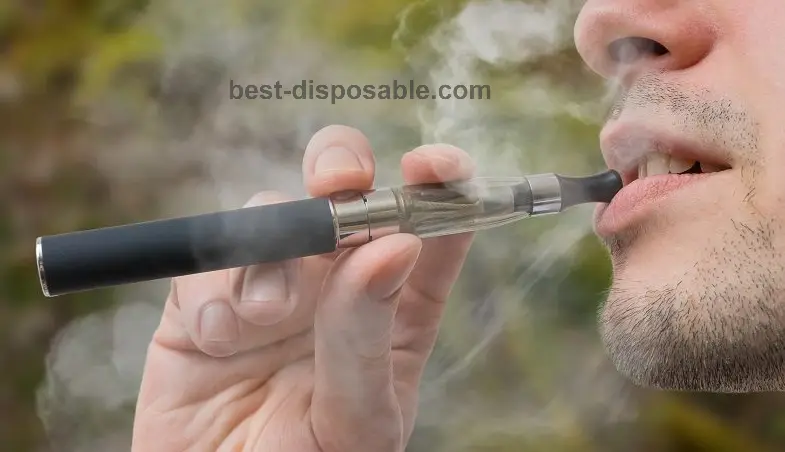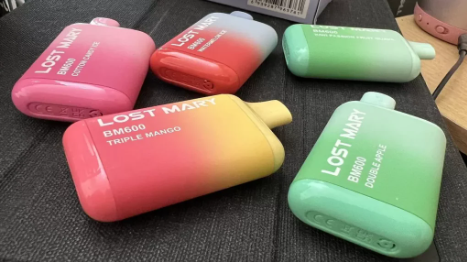Vaping, once seen as the “cool” and “safer” alternative to traditional smoking, has rapidly gained popularity among smokers, especially teenagers and young adults. The idea that it’s less harmful than smoking regular vape has led many to believe that vaping doesn’t come with the same risks. But here’s the truth: while vaping may avoid some of the most harmful aspects of traditional vape, it still brings serious concerns, particularly when it comes to your oral health.
You might’ve heard that vaping doesn’t contain tobacco, but that doesn’t mean it’s harmless. The substances in vape juice, including nicotine and flavors, still come with a variety of health risks—especially for your mouth, teeth, and gums.

1.What Exactly is Vaping?
Let’s break it down. Vaping refers to the use of a device—commonly known as a vape—where liquid (called e-juice or vape juice) is heated up to create vapor that you inhale. The vape juice is typically made of three main ingredients: nicotine, flavors, and a variety of chemicals. Unlike traditional vape, which burn tobacco to produce smoke, vapes use a heating element that turns the liquid into vapor, avoiding the harmful tar and carbon monoxide produced by burning.
It’s often marketed as a safer alternative, especially for those trying to quit smoking. However, don’t let the lack of tobacco fool you. Just because it doesn’t involve a flame doesn’t mean it’s free of risks.
2.How Does Vaping Affect Your Oral Health?
Now, let’s talk about how vaping can mess with your mouth. Even though there’s no tar or carbon monoxide in vape vapor, that doesn’t mean it’s without consequences. The ingredients in vape juice can still wreak havoc on your oral health in many ways.
Here’s how:
1. Oral Infections & Mouth Sores
Vaping can lead to damage in the tissues inside your mouth. The chemicals in the vape juice can irritate and break down the mucous membranes in your mouth, leading to mouth sores, irritation, and even ulcers. When these cells get damaged, it creates a perfect environment for bacteria to thrive, which can result in infections.
For those who vape regularly, you’re at a much higher risk of developing gum disease, tooth decay, or even more serious infections that require medical attention. So, if you’ve been noticing your mouth feels sore or you’re getting canker sores more often, your vape might be to blame.

2. Dry Mouth (Cottonmouth)
Ever had that “cottonmouth” feeling after a long night out? Well, vaping can give you that feeling too—except it’s not just a temporary thing. Nicotine, the main active ingredient in most vape juices, messes with your saliva production. Normally, saliva helps wash away food particles and bacteria in your mouth, keeping your teeth and gums healthy. But when you vape, nicotine reduces your mouth’s ability to produce saliva, leading to a dry mouth.
When your mouth gets too dry, your risk of tooth decay increases, and it also means you’re more likely to have bad breath. Speaking of which…
3. Bad Breath (Vape Breath)
You know how smokers often have that distinct “smoky” breath? Well, vapers aren’t exempt. The chemicals in the vape juice, especially the sweet flavors, can stick to your tongue, teeth, and the roof of your mouth, leading to a funky breath situation. This type of bad breath is often referred to as “vape breath,” and it can linger long after you’ve taken that last puff.
So, if you’re someone who vapes and is wondering why your breath smells less than fresh, it could be the vape juice residue sticking around.
4. Gum Disease & Gum Recession
Nicotine is known to be harmful to the gums. When you vape, the nicotine can reduce blood flow to your gums, weakening them over time. This can make your gums more prone to disease, such as gingivitis or periodontitis. With these conditions, your gums might start receding, bleed easily, or get inflamed.
If left untreated, this can lead to severe gum problems, which might even result in tooth loss. In short, vaping could accelerate gum disease and tooth decay—so it’s definitely not something to take lightly.
5. Tooth Decay
The reduced saliva flow combined with the acidic nature of some e-juices can create an environment that encourages cavities. Without enough saliva to protect your enamel, your teeth are more vulnerable to decay. Combine this with the fact that many e-juices have sugary or sweet flavors, and you’ve got a recipe for tooth decay.
Tooth sensitivity, cavities, and yellowing of teeth can all be the result of regular vaping. And the worst part? It could be happening without you even realizing it until it’s too late.

6. Oral Cancer (Yikes!)
Now, this one is still being studied, but the link between nicotine and oral cancer is well-established. Nicotine in both vape and vapes can lead to the development of cancer cells in your mouth, throat, and lungs. And while vapes might not contain all the same carcinogens as traditional vape, the chemicals in the vape liquid are still problematic. Plus, some vape juices contain other harmful chemicals that could contribute to cancer over time.
While researchers are still looking into the long-term effects of vaping, it’s definitely not something you want to mess with if you’re concerned about your overall health.
3.Why Are These Risks So Big for Teens and Young Adults?
Okay, let’s take a minute to talk about the younger generation. Vaping has become super popular among teens, largely because it’s marketed as a “cool” way to get nicotine without the stigma of smoking. Some even think that vaping is a safer, less damaging alternative to smoking.
But here’s the thing: your body and brain are still developing during your teenage years. When nicotine enters the picture, it messes with your brain’s development and could lead to long-term health issues. And because your teeth and gums are still developing too, the risks of vaping can be even more damaging during this period.
So, to all the teens out there—just because everyone’s doing it, doesn’t mean it’s safe for your health. Your future self will thank you if you avoid this habit before it becomes a problem.
4.What Can You Do to Protect Your Teeth and Gums?
Taking care of your oral health is essential, especially if you’ve been vaping or smoking. Even if you’re already dealing with the effects of nicotine and vape juice on your mouth, there are steps you can take to reverse some of the damage and maintain good oral hygiene going forward. The best thing you can do for your teeth, gums, and overall health is to quit vaping or smoking entirely. But in addition to cutting out harmful substances, here are some practical tips that can make a big difference in keeping your mouth fresh, clean, and healthy:
1. Brush and Floss Regularly
Brushing your teeth at least twice a day is the foundation of good oral hygiene. Brushing helps to remove plaque, bacteria, and food particles that can contribute to tooth decay, gum disease, and bad breath. Don’t forget to brush for a full two minutes to ensure all surfaces of your teeth are properly cleaned. Use a fluoride toothpaste, which helps protect against cavities and strengthens tooth enamel.
Flossing is just as important, as it gets into the places your toothbrush can’t reach, like between your teeth and along the gum line. Flossing once a day removes food particles and plaque buildup that can cause gum disease, cavities, and even bad breath. If you’re new to flossing, it may feel a little awkward at first, but with practice, it’ll become second nature.

2. Stay Hydrated
One of the most common oral health issues caused by vaping is dry mouth. When you vape, the nicotine decreases saliva production, and that can leave your mouth feeling dry and uncomfortable. Saliva is crucial because it helps wash away food particles and bacteria, protects your tooth enamel, and keeps your gums healthy.
To combat dry mouth, drink plenty of water throughout the day. Staying hydrated helps keep your mouth moist, promotes healthy saliva production, and flushes out bacteria. Plus, water helps neutralize acids in the mouth that can lead to tooth decay. Consider sipping water regularly, especially if you vape, as it can reduce the risk of mouth sores and infections.
3. Visit Your Dentist Regularly
You may think you’re brushing and flossing properly, but only a dentist can truly assess your oral health and catch potential issues early. Regular dental check-ups are essential, even if you don’t have any immediate concerns. Your dentist can detect early signs of gum disease, tooth decay, and other oral health problems that may not be visible to the naked eye.
If you vape or smoke, let your dentist know. They can provide specific advice on how to mitigate the negative effects of nicotine and vaping on your oral health. They might also suggest additional treatments, such as fluoride treatments or professional cleanings, to counteract the damage caused by smoking or vaping.
4. Use Mouthwash
Mouthwash isn’t just for freshening your breath—it’s an important part of oral hygiene. Many mouthwashes contain antibacterial agents that help kill the harmful bacteria in your mouth, reducing the risk of gum disease, cavities, and infections. If you’re dealing with dry mouth from vaping, look for mouthwashes that are designed to provide extra moisture.
Mouthwash can also help reduce bad breath (or “vape breath”) caused by the residue left in your mouth from vaping. It’s a quick and easy way to freshen up and add an extra layer of protection against the bacteria that can cause plaque buildup. Just be sure to choose a mouthwash that’s alcohol-free, as alcohol can actually dry out your mouth even more.
5. Quit Nicotine
This is probably the most important step you can take to protect your oral health. Nicotine, whether from smoking or vaping, is toxic to your gums and teeth. It restricts blood flow to your gums, which can make it harder for them to heal and fight infections. Over time, nicotine use can lead to gum recession, tooth loss, and even oral cancer.
If you’ve been using vape pens or smoking for a while, quitting can feel overwhelming, but the benefits to your oral health are well worth it. By cutting out nicotine, you’ll allow your gums to heal, and your overall oral health will significantly improve. Quitting nicotine can also reverse some of the damage to your teeth, including helping prevent further decay and gum recession.
If you need support quitting, there are resources available, such as smoking cessation programs, apps, and even counseling. Many people find success by tapering off gradually, or by using nicotine replacement therapies (like patches or gum) to make the transition easier. The key is to take that first step, and your mouth—and your body—will thank you.
6. Eat a Healthy Diet
What you eat plays a huge role in your oral health. Eating a balanced diet full of vitamins and minerals, such as calcium, vitamin D, and phosphorus, helps strengthen your teeth and gums. Foods like leafy greens, dairy products, nuts, and fish can all contribute to better oral health.
On the other hand, sugary and acidic foods can contribute to tooth decay and gum disease. If you vape, you might also have a heightened craving for sugary snacks, which can make the problem worse. Cutting back on sugary snacks and acidic drinks, like soda and fruit juices, will help reduce plaque buildup and protect your teeth from decay.
7. Consider Dental Products for Sensitive Teeth
If you’ve been vaping for a while and notice that your teeth are more sensitive, there are dental products designed specifically to address sensitivity. Toothpaste for sensitive teeth contains ingredients that help desensitize nerve endings and prevent pain from hot or cold foods and drinks. You might also want to use a soft-bristled toothbrush to avoid irritating sensitive gums or tooth enamel.
For even more protection, your dentist might recommend fluoride treatments or desensitizing gels. These treatments help strengthen your tooth enamel and provide a protective barrier against sensitivity.
8. Protect Your Teeth with a Night Guard
If you vape or smoke, you may be more prone to grinding your teeth—especially during sleep. Teeth grinding (or bruxism) can wear down your enamel, leading to tooth sensitivity and even cracks or chips. If you’ve noticed that you grind your teeth at night, consider using a custom night guard.
A night guard is a soft plastic device that fits over your teeth and prevents them from grinding against each other while you sleep. Your dentist can help you get a custom-fit night guard, which will provide the best protection for your teeth.
5.Conclusion: Is Vaping Worth the Risk?
At the end of the day, vaping might seem like a fun trend or a “less harmful” alternative to smoking, but it still poses serious risks to your oral health. From gum disease to tooth decay and even cancer, the ingredients in vape juice can damage your mouth in ways you might not even realize until it’s too late.
If you care about your smile, your breath, and your overall health, consider kicking the vape habit. And if you need help quitting, don’t hesitate to reach out to a healthcare professional. Your mouth—and your future self—will thank you.If you are looking for a healthier vape, you can click on our store, we offer a wealth of geek bar flavors and lost mary flavors.

